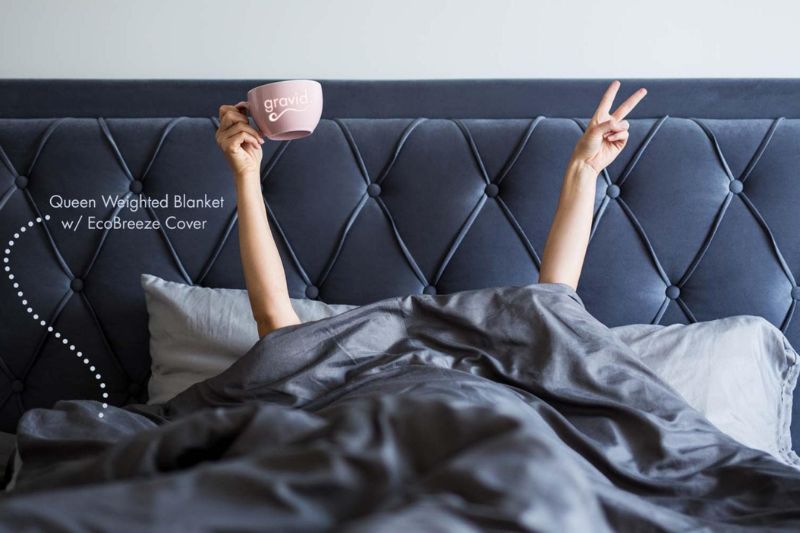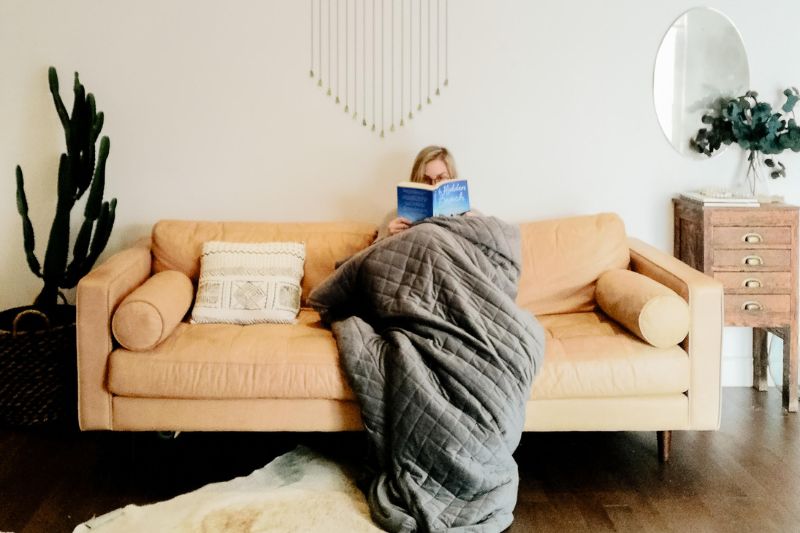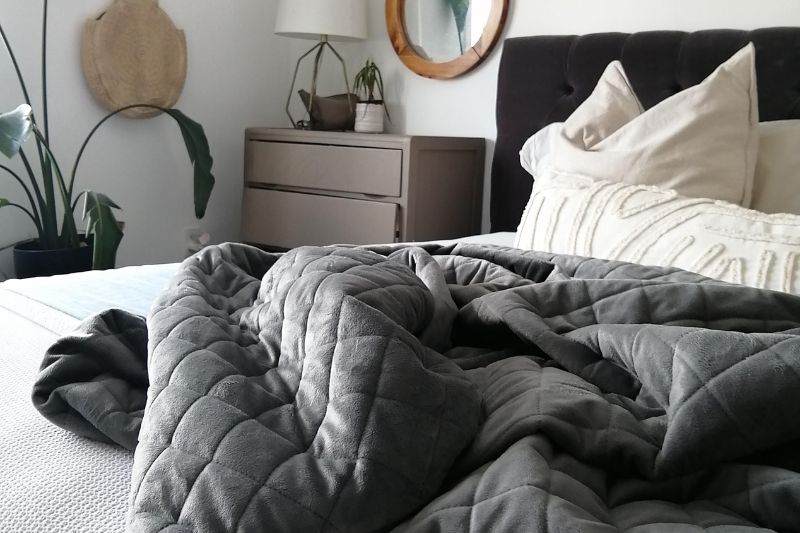How And Why Does a Weighted Blanket Work

The weighted blanket is a simple yet effective remedy that has helped many people get a good night's sleep. It becomes a comforting companion when the humdrum of everyday life, stress, and sleep issues interfere with your restful slumber.
Let's explore how these weighted blankets work. We'll learn how it helps with sleep disorders and difficulty falling asleep and how it can benefit conditions like ASD (Autism Spectrum Disorder) and ADHD.
What are Weighted Blankets?
These blankets, which were first made for people with anxiety, insomnia, or sensory processing issues, have increased in popularity due to their ability to promote relaxation and quality of sleep for a variety of users.
Now that you know what weighted blankets are, the next question is: How do they work?
Struggling to sleep? Suffering from insomnia and anxiety? Gravid’s weighted blankets are filled with non-toxic, micro-rounded glass beads, which are the best material for people with any auditory, sensory, or physical sensitivities. Try it today!
How Does a Weighted Blanket Work?
Weighted blankets provide a comforting embrace, applying gentle pressure across your body reminiscent of a warm and soothing hug.
This tactile stimulation gives a sense of security and relaxation, creating a cocoon-like experience that promotes calmness and enhances overall well-being. It has both physical and psychological effects, primarily by applying deep pressure stimulation (DPS). Here's how it works:
Physical Effects:
Deep Pressure Stimulation (DPS):
As mentioned earlier, the gentle pressure of the weighted blanket mimics the feeling of being hugged or held, which can activate the parasympathetic nervous system.
This system is responsible for calming the body and promoting relaxation. As a result, your heart rate and breathing slow down, muscle tension eases, and stress hormones like cortisol decrease.
Increased Serotonin and Melatonin Production:
DPS is thought to stimulate the production of serotonin, a mood-boosting neurotransmitter, and melatonin, a hormone that regulates sleep. This can further contribute to feelings of calmness and improved sleep quality.
Improved Sensory Input:
For some individuals, the weight of the blanket can provide a sense of security and grounding, reducing anxiety and restlessness.

Psychological Effects:
The feeling of Security and Comfort:
The weight of the blanket can provide a sense of security and comfort, similar to being swaddled as a baby. This can be particularly helpful for individuals with anxiety or who struggle to relax.
Reduced Anxiety and Stress:
The physiological changes associated with DPS, such as lowered heart rate and muscle tension, can also reduce anxiety and stress levels.
Improved Sleep Quality:
The combination of physical and psychological effects can lead to improved sleep quality. People often report falling asleep faster, staying asleep longer, and experiencing deeper sleep when using a weighted blanket.
Overall, weighted blankets are a safe and effective way to promote relaxation, reduce anxiety, and improve sleep quality for many people.
How Heavy Should a Weighted Blanket Be?
Are you thinking of adding a weighted blanket to your bedtime routine? Remember, weight matters! For optimal comfort and the full benefits of deep sleep, most experts recommend choosing a blanket that weighs roughly 10% of your body weight.
Adults should go for a weighted blanket between 12 and 20 pounds as a general guideline. This weight creates a gentle "hugging" sensation, promoting relaxation, reducing stress, and easing you into a peaceful slumber. The right-sized weighted blanket will help you achieve deeper sleep, leaving you feeling refreshed and energized upon waking.
|
15lb |
you weigh less than 160 lb |
|
20lb |
you weigh more than 160 lb |
|
30lb+ |
you are sharing with a partner |
Why Does A Weighted Blanket Work?
1. Helps With Insomnia
Does anxiety keep you up at night? Restlessness and insomnia often go hand-in-hand with anxiety, causing fatigue and impacting your overall well-being. But don't worry, there is hope!
Weighted blankets are a natural solution for combatting anxiety-induced sleep disturbances. With gentle pressure, these cozy blankets work wonders by boosting dopamine levels.
Dopamine, a neurotransmitter associated with happiness and calmness, can be activated by the weight of the blanket. This natural high helps counteract the stress hormone cortisol, which often fuels anxiety.
The comforting weight mimics a hug or being held, creating a safe and secure feeling that eases anxiety and promotes relaxation. It calms the nervous system. Deep pressure stimulation can activate the parasympathetic nervous system, which calms the body and promotes sleep.

2. Weighted Blankets Improve ADHD Behavior in Children
These blankets are especially suitable for children and those struggling with sleep issues associated with ADHD and autism.
Regular use aims to provide a sense of comfort and protection, specifically for children with autism and sleep difficulties or restless children with ADHD. The weight of the blanket fulfills the tactile needs, promoting a feeling of security and well-being.
3. Weighted Blanket Improves Sleep
People with sensory issues or insomnia often struggle to achieve restful sleep. Weighted blankets, however, offer a promising solution.
A study was conducted comparing the use of weighted blankets and light blankets for improving sleep. After 4 weeks, they found that people using the weighted blankets had significantly better scores on a measure of insomnia compared to those using light blankets.
The improvement was noticeable, and the weighted blanket users also experienced better sleep quality, increased daytime activity, and reduced symptoms of fatigue, depression, and anxiety. No serious problems were reported.
This positive outcome is attributed to the weighted blanket's ability to limit tossing and turning throughout the night, allowing for deeper, more restorative sleep.
4. Lowers Cortisol Level
Cortisol is commonly known as the "stress hormone." The deep pressure provided by weighted blankets can help reduce cortisol levels by promoting relaxation. This relaxation response can shift the body from its "fight or flight" stress response to a more relaxed state.
Self-care is important. Invest in your well-being with Gravid’s premium weighted blankets.
5. Calms OCD (Obsessive-Compulsive Disorder)
When using a weighted blanket, people with obsessive-compulsive disorder (OCD) report feeling more relaxed and at ease. This calming effect is partly due to the increased serotonin levels caused by the deep touch pressure from the weight of the beads and other materials in the blanket.
6. Helps Recovery from Traumatic Stress Disorder
PTSD is a condition that can be brought on by a traumatic event in a person's life. Weighted blankets can help with PTSD, aggression, and bipolar disorder symptoms.
PTSD is often characterized by hyperarousal, a state of heightened anxiety and sensitivity to stimuli. The grounding effect of a weighted blanket might help reduce these symptoms, providing a calming influence that can counteract feelings of hyperarousal.
Are Weighted Blankets Safe?

While weighted blankets offer comfort and relaxation for most adults, you should consider individual circumstances before snuggling under their substantial weight. Those with underlying health conditions, especially those affecting breathing or circulation, should consult their doctor first.
The pressure exerted by the blanket could potentially worsen issues like asthma, low blood pressure, or type 2 diabetes. Additionally, claustrophobic individuals might find the weight constricting, and those with limited mobility could struggle to move freely under its cover.
For children, the picture is less clear. While manufacturers often advise against using weighted blankets with toddlers under two due to suffocation risks, some market "kid-friendly" versions. However, regardless of the manufacturer's claims, consulting your pediatrician is crucial to determine the suitability of a weighted blanket for your child.
Buying Guide for Weighted Blankets
Here's a buying guide to help you choose the right weighted blanket for your needs:
- Weight Selection: Choose a blanket around 10% of your body weight. For example, if you weigh 150 pounds, opt for a 15-pound blanket. However, personal preferences vary, so you should try different weights to find the most comfortable one.
- Size: Ensure that the blanket's size is suitable for your body. It should cover you from neck to toe but not hang off the sides of the bed. Common sizes include twin, full, queen, and king.
- Material: Weighted blankets are made from various materials, such as cotton, bamboo or Tencel Lyocell. Choose a material that suits your preferences and is breathable to prevent overheating.
- Durability and Maintenance: Inspect the overall build and stitching quality for durability. While some blankets only need to be spot-cleaned, others may have detachable covers for convenient washing.
- Brand and Reviews: To learn more about the use and durability of specific weighted blankets, look up reputable brands and read customer reviews.
And that’s a wrap! We hope this article was helpful in conveying how useful weighted blankets are and why you should get one!
Try Gravid weighted blankets with the Breeze cooling cover, which is made using 100% Tencel Lyocell, an eco-friendly, renewable, high-tenacity fiber that gives it high strength properties. It is softer than cotton, has a luxurious sheen and is extremely breathable.
